| Listing 1 - 9 of 9 |
Sort by
|
Book
ISBN: 1283141558 1443824771 9786613141552 9781443824774 9781443824132 1443824135 9781283141550 Year: 2010 Publisher: Newcastle upon Tyne
Abstract | Keywords | Export | Availability | Bookmark
 Loading...
Loading...Choose an application
- Reference Manager
- EndNote
- RefWorks (Direct export to RefWorks)
Factual Fictions: Narrative Truth and the Contemporary American Documentary Novel focuses on contemporary American documentary narratives, specifically the documentary novel, as it re-emerged in the 1960s and later developed into various other forms. The book explores the connections between the documentary novel and the concurrent rise of the New Journalism (a.ka. "literary journalism") in the United States, situating the two genres in the cultural context of the tumultuous 1960s and an emer...
Nonfiction novel --- American fiction --- Literature and society --- Realism in literature. --- American prose literature --- Documentary story --- Journalistic novel --- New journalism --- Novel, Nonfiction --- Fiction --- Reportage literature --- Neorealism (Literature) --- Magic realism (Literature) --- Mimesis in literature --- History and criticism. --- History
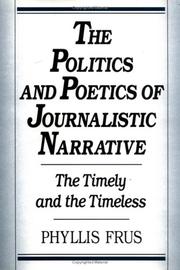
ISBN: 0521443245 052110274X 0511527152 Year: 1994 Publisher: Cambridge : Cambridge University Press,
Abstract | Keywords | Export | Availability | Bookmark
 Loading...
Loading...Choose an application
- Reference Manager
- EndNote
- RefWorks (Direct export to RefWorks)
The Politics and Poetics of Journalistic Narrative investigates the textuality of all discourse, arguing that the ideologically charged distinction between 'journalism' and 'fiction' is socially constructed rather than natural. Phyllis Frus separates literariness from aesthetic definitions, regarding it as a way of reading a text through its style to discover how it 'makes' reality. Frus examines narratives by Stephen Crane and Ernest Hemingway, showing that conventional understanding of the categories of fiction and non-fiction frequently determines the differences we perceive in texts. When journalists writing about historical events adopt the Hemingway-esque, understated narrative style that is commonly associated with both 'objectivity' and 'literature', it leads to an audience unable to face the historical and social conditions in which it must function. She interprets New Journalistic narratives, such as that of Truman Capote, as ways to counter the reification of modern consciousness to which both objective journalism and aestheticised fiction contribute.
Narration (Rhetoric) --- Narration (Rhétorique) --- Narrative writing --- Verhaal (Retoriek) --- American prose literature --- Journalism --- Nonfiction novel --- Politics and literature --- Reportage literature, American --- History and criticism. --- History --- Narration (Rhetoric). --- 20th century --- History and criticism --- United States --- Reportage literature [American ] --- Arts and Humanities --- Literature --- Rhetoric --- Discourse analysis, Narrative --- Narratees (Rhetoric) --- Documentary story --- Journalistic novel --- New journalism --- Novel, Nonfiction --- Fiction --- Reportage literature
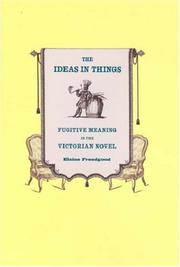
ISBN: 1282754017 9786612754012 0226261549 9780226261546 0226261557 9780226261553 9781282754010 661275401X 0226261638 9780226261638 Year: 2006 Publisher: Chicago University of Chicago Press
Abstract | Keywords | Export | Availability | Bookmark
 Loading...
Loading...Choose an application
- Reference Manager
- EndNote
- RefWorks (Direct export to RefWorks)
While the Victorian novel famously describes, catalogs, and inundates the reader with things, the protocols for reading it have long enjoined readers not to interpret most of what crowds its pages. The Ideas in Things explores apparently inconsequential objects in popular Victorian texts to make contact with their fugitive meanings. Developing an innovative approach to analyzing nineteenth-century fiction, Elaine Freedgood here reconnects the things readers unwittingly ignore to the stories they tell. Building her case around objects from three well-known Victorian novels-the mahogany furniture in Charlotte Brontë's Jane Eyre, the calico curtains in Elizabeth Gaskell's Mary Barton, and "Negro head" tobacco in Charles Dickens's Great Expectations-Freedgood argues that these things are connected to histories that the novels barely acknowledge, generating darker meanings outside the novels' symbolic systems. A valuable contribution to the new field of object studies in the humanities, The Ideas in Things pushes readers' thinking about things beyond established concepts of commodity and fetish.
English fiction --- Material culture in literature. --- Material culture --- Culture --- Folklore --- Technology --- History and criticism. --- History --- thing theory, victorian, literature, great expectations, charles dickens, tobacco, negro head, mary barton, elizabeth gaskell, calico curtains, jane eyre, charlotte bronte, furniture, mahogany, sadism, power, violence, control, hierarchy, colonialism, slavery, plantation, deforestation, cozy, domesticity, cotton markets, capitalism, middlemarch, george eliot, genocide, fetishism, realism, novel, nonfiction, material culture, objects.
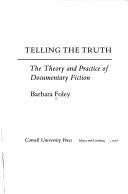
ISBN: 0801418771 1501722891 9781501722899 9780801418778 1501722905 1501722883 Year: 1986 Publisher: Ithaca, N.Y.
Abstract | Keywords | Export | Availability | Bookmark
 Loading...
Loading...Choose an application
- Reference Manager
- EndNote
- RefWorks (Direct export to RefWorks)
Barbara Foley here focuses on the relatively neglected genre of documentary fiction: novels that are continually near the borderline between factual and fictive discourse. She links the development of the genre over three centuries to the evolution of capitalism, but her analyses of literary texts depart significantly from those of most current Marxist critics. Foley maintains that Marxist theory has yet to produce a satisfactory theory of mimesis or of the development of genres, and she addresses such key issues as the problem of reference and the nature of generic distinctions. Among the authors whom Foley treats are Defoe, Scott, George Eliot, Joyce, Isherwood, Dos Passos, William Wells Brown, Ishmael Reed, and Ernest Gaines.
Fiction --- Comparative literature --- anno 1800-1999 --- 82-31 --- American fiction --- -Historical fiction, American --- -Marxist criticism --- Reportage literature, American --- -Nonfiction novel --- -Documentary story --- Journalistic novel --- New journalism --- Novel, Nonfiction --- Reportage literature --- American reportage literature --- American prose literature --- Criticism, Marxist --- Marxian criticism --- Marxist literary criticism --- Communism and literature --- Communist aesthetics --- Criticism --- American historical fiction --- American literature --- Roman --- History and criticism --- Historical fiction, American --- Marxist criticism. --- Nonfiction novel --- History and criticism. --- -Roman --- 82-31 Roman --- -Criticism, Marxist --- Documentary story --- Marxist criticism --- Literary theory
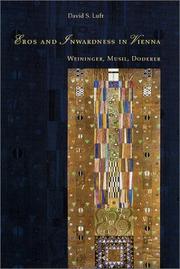
ISBN: 1283150794 9786613150790 0226496481 9780226496481 0226496473 9780226496474 0226496473 9780226496474 9781283150798 6613150797 Year: 2003 Publisher: Chicago University of Chicago Press
Abstract | Keywords | Export | Availability | Bookmark
 Loading...
Loading...Choose an application
- Reference Manager
- EndNote
- RefWorks (Direct export to RefWorks)
Although we usually think of the intellectual legacy of twentieth-century Vienna as synonymous with Sigmund Freud and his psychoanalytic theories, other prominent writers from Vienna were also radically reconceiving sexuality and gender. In this probing new study, David Luft recovers the work of three such writers: Otto Weininger, Robert Musil, and Heimito von Doderer. His account emphasizes the distinctive intellectual world of liberal Vienna, especially the impact of Schopenhauer and Nietzsche in this highly scientific intellectual world. According to Luft, Otto Weininger viewed human beings as bisexual and applied this theme to issues of creativity and morality. Robert Musil developed a creative ethics that was closely related to his open, flexible view of sexuality and gender. And Heimito von Doderer portrayed his own sexual obsessions as a way of understanding the power of total ideologies, including his own attraction to National Socialism. For Luft, the significance of these three writers lies in their understandings of eros and inwardness and in the roles that both play in ethical experience and the formation of meaningful relations to the world-a process that continues to engage artists, writers, and thinkers today. Eros and Inwardness in Vienna will profoundly reshape our understanding of Vienna's intellectual history. It will be important for anyone interested in Austrian or German history, literature, or philosophy.
Austrian literature --- Politics and literature --- National socialism --- History and criticism. --- Freud, Sigmund, --- Influence. --- Vienna (Austria) --- Intellectual life. --- Social life and customs. --- vienna, sexuality, gender, 20th century, freud, heimito von doderer, robert musil, otto weininger, nietzsche, schopenhauer, bisexuality, creativity, morality, ethics, flexibility, obsession, kink, desire, passion, control, self-control, ideology, nazi, fascism, submission, totalitarianism, eros, individual, agency, isolation, history, literature, philosophy, irrationalism, scientific materialism, character, national socialism, novel, nonfiction, apperception, soul, modernity, liberalism.
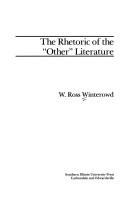
ISBN: 0585071918 9780585071916 0809315874 9780809315871 Year: 1990 Publisher: Carbondale Southern Illinois University Press
Abstract | Keywords | Export | Availability | Bookmark
 Loading...
Loading...Choose an application
- Reference Manager
- EndNote
- RefWorks (Direct export to RefWorks)
Reportage literature, American --- American prose literature --- Journalism --- Rhetoric --- Canon (Literature) --- Nonfiction novel. --- Literary form. --- English language --- Nonfiction novel --- Literary form --- American Literature --- English --- Languages & Literatures --- American literature --- American reportage literature --- Documentary story --- Journalistic novel --- New journalism --- Novel, Nonfiction --- Fiction --- Reportage literature --- Form, Literary --- Forms, Literary --- Forms of literature --- Genre (Literature) --- Genre, Literary --- Genres, Literary --- Genres of literature --- Literary forms --- Literary genetics --- Literary genres --- Literary types (Genres) --- Literature --- Classics, Literary --- Literary canon --- Literary classics --- Best books --- Criticism --- Language and languages --- Speaking --- Authorship --- Expression --- Literary style --- History and criticism. --- History and criticism --- Theory, etc. --- History --- Rhetoric. --- Theory, etc --- Germanic languages --- History.
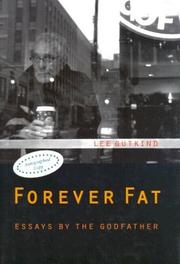
ISBN: 0585471282 9780585471280 0803221940 9780803221949 Year: 2003 Publisher: Lincoln University of Nebraska Press
Abstract | Keywords | Export | Availability | Bookmark
 Loading...
Loading...Choose an application
- Reference Manager
- EndNote
- RefWorks (Direct export to RefWorks)
Authors, American --- College teachers --- Editors --- Creative writing (Higher education) --- Prose literature --- Nonfiction novel --- English --- Languages & Literatures --- American Literature --- Documentary story --- Journalistic novel --- New journalism --- Novel, Nonfiction --- Fiction --- Reportage literature --- Literature --- Persons --- Academicians --- Academics (Persons) --- College instructors --- College lecturers --- College professors --- College science teachers --- Lectors (Higher education) --- Lecturers, College --- Lecturers, University --- Professors --- Universities and colleges --- University academics --- University instructors --- University lecturers --- University professors --- University teachers --- Teachers --- American authors --- Creative writing --- Technique. --- Technique --- Faculty --- Study and teaching (Higher) --- Gutkind, Lee. --- Creative nonfiction (Urbana, Ill.) --- Gutkin, Lee

ISBN: 0807812811 Year: 1977 Publisher: Chapel Hill : University of North Carolina Press,
Abstract | Keywords | Export | Availability | Bookmark
 Loading...
Loading...Choose an application
- Reference Manager
- EndNote
- RefWorks (Direct export to RefWorks)
Documentaire roman --- Journalism --- Journalisme --- Journalistiek --- New journalism --- Nieuwe journalisme --- Nonfiction novel --- Nouveau journalisme --- Roman documentaire --- American fiction --- Reportage literature, American --- Roman américain --- Littérature de reportage américaine --- History and criticism --- Histoire et critique --- 070.421 --- -Journalism --- -Reportage literature, American --- -Nonfiction novel --- -#SBIB:309H301 --- #SBIB:309H302 --- Documentary story --- Journalistic novel --- Novel, Nonfiction --- Fiction --- Reportage literature --- American reportage literature --- American prose literature --- Writing (Authorship) --- Literature --- Publicity --- American literature --- Redaktie en rubrieken --- De communicator in de verschillende media (pers, omroep, film, boekenindustrie, ...) --- De communicator: opleiding, statuut, deontologie, zelfbeeld, sociale positie,... --- History and criticism. --- 070.421 Redaktie en rubrieken --- Roman américain --- Littérature de reportage américaine --- #SBIB:309H301 --- De communicator: opleiding, statuut, deontologie, zelfbeeld, sociale positie,.. --- Wolfe, Tom --- Mailer, Norman --- 20th century --- De communicator: opleiding, statuut, deontologie, zelfbeeld, sociale positie,. --- De communicator: opleiding, statuut, deontologie, zelfbeeld, sociale positie,
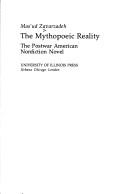
ISBN: 0252005236 9780252005237 Year: 1976 Publisher: Urbana University of Illinois Press
Abstract | Keywords | Export | Availability | Bookmark
 Loading...
Loading...Choose an application
- Reference Manager
- EndNote
- RefWorks (Direct export to RefWorks)
Fiction --- American literature --- anno 1900-1999 --- Capote, Truman, 1924-1984. In Cold Blood --- Documentaire roman --- Hersey, John Richard, 1914 . Hiroshima --- Lewis, Oscar, 1914-1970. La Vida --- Nonfiction novel --- Roman documentaire --- Reportage literature, American --- American prose literature --- Littérature de reportage américaine --- Prose américaine --- History and criticism --- Histoire et critique --- World War, 1939-1945 --- Journalism --- Influence --- Technique --- History --- -Fiction --- -Journalism --- -Reportage literature, American --- -World War, 1939-1945 --- -Nonfiction novel --- -Documentary story --- Journalistic novel --- New journalism --- Novel, Nonfiction --- Reportage literature --- European War, 1939-1945 --- Second World War, 1939-1945 --- World War 2, 1939-1945 --- World War II, 1939-1945 --- World War Two, 1939-1945 --- WW II (World War, 1939-1945) --- WWII (World War, 1939-1945) --- History, Modern --- American reportage literature --- Writing (Authorship) --- Literature --- Publicity --- Metafiction --- Novellas (Short novels) --- Novels --- Stories --- Novelists --- -History and criticism --- Philosophy --- History and criticism. --- Technique. --- Influence. --- Littérature de reportage américaine --- Prose américaine --- Documentary story --- Fiction writing --- Writing, Fiction --- Authorship --- 20th century --- Mailer, Norman --- Pynchon, Thomas --- Wolfe, Tom --- Warhol, Andy --- World War, 1939-1945 - United States - Influence --- Nonfiction novel - History and criticism --- Reportage literature, American - History and criticism --- American prose literature - 20th century - History and criticism --- Fiction - Technique --- Journalism - United States - History - 20th century
| Listing 1 - 9 of 9 |
Sort by
|

 Search
Search Feedback
Feedback About UniCat
About UniCat  Help
Help News
News